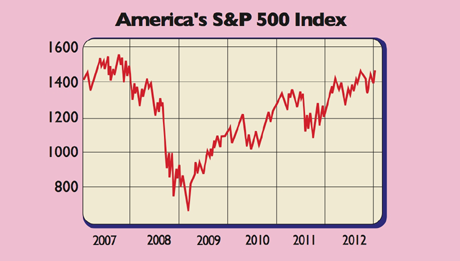Get the latest financial news, insights and expert analysis from our award-winning MoneyWeek team, to help you understand what really matters when it comes to your finances.
You are now subscribed
Your newsletter sign-up was successful
Want to add more newsletters?

Twice daily
MoneyWeek
Get the latest financial news, insights and expert analysis from our award-winning MoneyWeek team, to help you understand what really matters when it comes to your finances.

Four times a week
Look After My Bills
Sign up to our free money-saving newsletter, filled with the latest news and expert advice to help you find the best tips and deals for managing your bills. Start saving today!
Stocks have started 2013 with a bang. America's S&P 500 index has risen to a new post-crisis high. The FTSE 100 has exceeded 6,100 for the first time since May 2008. It gained almost 4% last week, its best start to a year since 1999. Japanese stocks have hit a 23-month high. Investors poured a net $22.2bn into global stocks last week, the biggest weekly inflow since September 2007.
So "one of the biggest questions in financial markets is again bubbling", says Carolyn Cui in The Wall Street Journal. For some time now, many have predicted a "Great Rotation" by investors out of bonds and into stocks.
Bonds, they reason, are absurdly expensive and can't rise much higher. Once the bubble bursts, the money must surely flow into equities, implying a major uptrend. For years, this has been proved wrong. But is it now happening?
MoneyWeek
Subscribe to MoneyWeek today and get your first six magazine issues absolutely FREE

Sign up to Money Morning
Don't miss the latest investment and personal finances news, market analysis, plus money-saving tips with our free twice-daily newsletter
Don't miss the latest investment and personal finances news, market analysis, plus money-saving tips with our free twice-daily newsletter
Post-bubble hangover continues
The inflows into stocks have certainly been impressive, but as Citigroup's Adrian Cattley says, "we've seen this type of flow into equities before in January". Note too that "many things must go right for [the Great Rotation] to play out", as the Financial Times puts it.
An end to the bond boom implies a return to healthy, pre-crisis growth rates, with central banks no longer hoovering up debt with printed money. But the developed world shows scant sign of shaking off the post-bubble hangover.
Despite unprecedented money printing in recent years, "signs of this flood of high-powered money helping the economy are tentative at best", says James Mackintosh in the FT. Indeed, average forecasts for America, the eurozone and Japan are all for weaker growth this year than last.

No wonder, then, that global earnings have been subsiding since the spring of last year. In the US, which sets the tone for world markets, poor recent revenue growth and historically high margins militate against a significant earnings rebound. It hardly helps matters that "investors are overoptimistic on earnings", says Michael Kastner of Halyard Asset Management.
Moreover, stocks rarely embark on major bull runs if they don't start at undervalued levels. Cyclically adjusted price/earnings ratios are historically high in America, although Europe is still cheap.
Longer-term, even if the economic outlook radically improves and central banks stop propping up bonds, they could still prove more resilient than expected. Pension funds "are heading inexorably towards bond-heavy portfolios as theirmembership matures and they reduce risk and aim for income", says Buttonwood on Economist.com. "The same approach will be followed by ageing savers."
As Buttonwood points out, if growth improves dramatically, central banks will have to mop up the liquidity they created, which would create a headwind for stocks. If they don't do this fast enough, inflation could take off.
That's bad news for bonds and doesn't do stocks any favours either: US share prices fell by a third, in real terms, during the inflationary 1970s. Add all this up and we might see "a mini-rotation" into stocks, but not a flood.
Stocks are due a breather
So much for the big picture. For now, though, investors are ignoring the reasons to treat equities with caution. In recent years markets have ignored fundamentals and become "addicted to liquidity", says Citigroup's Willem Buiter. And they have got used to the main threats on the horizon a US debt stand-off in Congress and eurozone upheaval. Tim Rees of Insight Investment Management calls this "fear resilience". An "absence of new fears" has also fuelled confidence.
Bullish sentiment is starting to reach historically high levels, as we noted last week, which increases the odds of a near-term setback. Still, despite the murky near- and long-term outlook, the fact remains that buying stocks when they're cheap is the key to healthy long-term returns. So investors should tuck away some European shares today.
Get the latest financial news, insights and expert analysis from our award-winning MoneyWeek team, to help you understand what really matters when it comes to your finances.
MoneyWeek is written by a team of experienced and award-winning journalists, plus expert columnists. As well as daily digital news and features, MoneyWeek also publishes a weekly magazine, covering investing and personal finance. From share tips, pensions, gold to practical investment tips - we provide a round-up to help you make money and keep it.
-
 Pension Credit: should the mixed-age couples rule be scrapped?
Pension Credit: should the mixed-age couples rule be scrapped?The mixed-age couples rule was introduced in May 2019 to reserve pension credit for older households but a charity warns it is unfair
-
 Average income tax by area: The parts of the UK paying the most tax mapped
Average income tax by area: The parts of the UK paying the most tax mappedThe UK’s total income tax bill was £240.7 billion 2022/23, but the tax burden is not spread equally around the country. We look at the towns and boroughs that have the highest average income tax bill.

